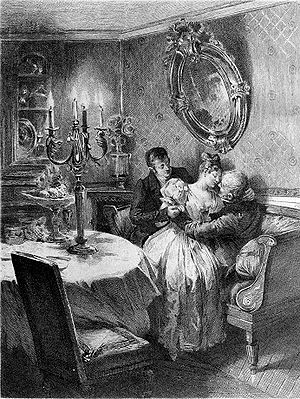Le Père Goriot
(Redirected from Le Pere Goriot)
 Title page from the 1897 edition | |
| Written by: | Honoré de Balzac |
|---|---|
| Central Theme: | Selfishness versus generosity |
| Synopsis: | The sometimes intercrossing stories of a father too weak to detach himself of his two leech-like daughters and a young social climber that loses his innocence in his pursuit of status. |
| Genre(s): | Historical fiction |
| First published: | March 1835 |
Set in Paris in 1819, Le Père Goriot by Honoré de Balzac is the story of an overly indulgent father and his two spoiled daughters, and a naive young student who is determined to learn the social climbing game. Goriot's daughters Anastasie and Delphine have married powerful wealthy men, yet they can't stay out of debt and suck their father financially and emotionally dry. Meanwhile, Eugène de Rastignac loses his innocence in his pursuit of money and status, first being told the price by the sinister and enigmatic Vautrin, and then experiencing it for himself. Père Goriot, sometimes translated Old Goriot, is one novel in a vast series of stories by Balzac called La Comédie humaine, or The Human Comedy.
Tropes used in Le Père Goriot include:
- Above Good and Evil: Vautrin.
- All Jews Are Cheapskates: Vautrin's mentions this.
- Ambiguously Gay: Vautrin is one of the first strong gay (even if not openly stated) characters in literature.
- Ambition Is Evil: Eugène's goals eventually lead him to corruption, as illustrated in novels he reappears in.
- An Offer You Can't Refuse: Actually, the line from The Godfather was taken almost verbatim from here, where Vautrin makes the same comment to Eugène. This, in turn, is based on a concept mentioned by Jean-Jacques Rosseau (the philosopher, not a character in the book).
- Badass Gay: Vautrin.
- Big Fancy House: The homes of Madame de Beauséant, Delphine, and Anastasie.
- Character Title
- Conspicuous Consumption: This trope makes several appearances, one of the most notable being when Anastasie de Restaud's husband buys back the diamonds she pawned so that she can wear them to a ball to defy the rumors of her debt.
- The Corrupter: Vautrin plays this role to Eugène.
- Crapsack World: Both Vautrin and Madame de Beauséant explain to Eugène how Parisian high society is this.
- Crunchtastic: Residents of the Maison Vauquer love making up new words ending in "-orama."
- The Cynic: Vautrin.
- Daddy's Girl: Twisted because Goriot's reverent love for his daughters is one-sided.
- Emotional Torque
- The Gambling Addict: Anastie's lover.
- Gayngster: Vautrin is O.G.
- Gay Paree
- Get Rich Quick Scheme:
- Eugène courting Delphine and introducing her to Madame de Beuséant, which would enter both lovers into the realm of top-tier society.
- Vautrin's proposal to Eugène: kill Victorine Taillefer's brother so she can solely inherit her father's vast fortune, and marry her.
- Greed: A major theme of the novel.
- Grey and Gray Morality
- Gold Digger:
- A major motive of Eugène's considering Anastasie de Restaud, Delphine de Nucingen, and Victorine Taillefer as potential partners.
- Delphine's reason for wanting to make acquaintances with Madame de Beuséant.
- If I Were a Rich Man
- Impoverished Patrician: What Goriot's two daughters have become, due to their material indulgence and their financially broke lovers.
- It's Personal: Eugène's attitude towards Paris at the end.
"It's between you and me now!" |
- Meal Ticket: Anastasie, Delphine, and Victorine, to Eugène.
- Naive Newcomer: Eugène.
- Pimped-Out Dress: What else would the classiest ladies of 19th-century Paris wear?
- Secretly Wealthy: Madame Vauquer has a secret savings of 40,000 francs, but remains landlady of a modest boardinghouse.
- Self-Made Man: Goriot earned his fortune using his own business smarts as a flour merchant.
- Socialite: Nearly all the novel's major characters either are or aspire to be this.
- Spoiled Brat: The unfortunate result of Goriot's never-ending desire to indulge his daughters' every wish.
- Wide-Eyed Idealist: Eugène, at the novel's beginning.
- The Woobie: Goriot.